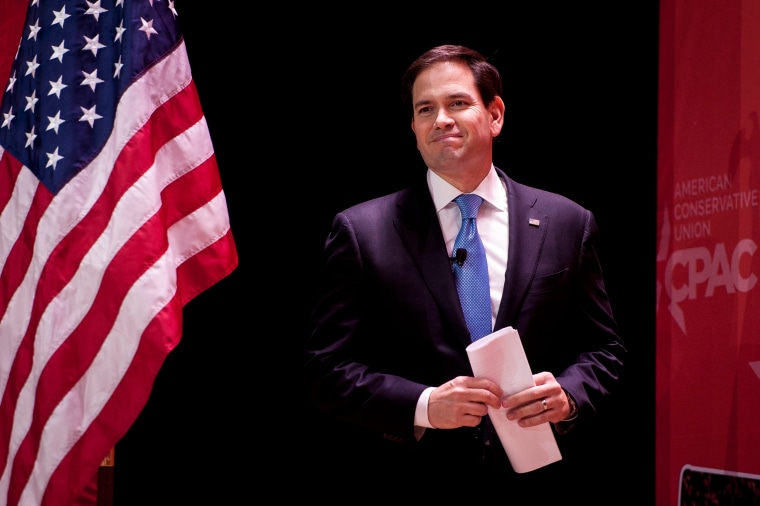A growing group of Senate Republicans has become frustrated with attempts by senators Tom Cotton of Arkansas and Marco Rubio of Florida to add amendments that could tank a bipartisan bill that would require that Congress approve any Iran nuclear deal before congressional sanctions are rolled back.
The move by Cotton and Rubio has delayed consideration of the bill, and may result in Senate Majority Leader Mitch McConnell, R-Ky., deciding to end debate and stop any additional amendment votes in an effort to maintain the bill's bipartisan support — a move called filing cloture.
"I think the result is going to be an ironic one, because I believe it will leave the Majority Leader little choice but to file cloture," Republican Sen. Susan Collins of Maine told NBC News. "It's unfortunate that on a bipartisan bill with overwhelming support, where we were proceeding well in the amendment process, that this happened."
Late last week, Sen. Cotton went to the Senate floor and requested a vote on his and Sen. Rubio's amendments.
The move took leadership by surprise.
Cotton's amendment would not allow Iran to get sanctions relief until it gave up its nuclear facility, disclosed the past military dimensions of their nuclear program, and accepted a fully verifiable inspections regime. Rubio's amendment would require that Iran recognize Israel's right to exist as a Jewish state.
But Democrats objected to voting on the amendments, saying they are not relevant to the ongoing negotiations between six world powers and Iran over the country's nuclear program. In addition, if the amendments were added to the bill it would all but assure that President Barack Obama would veto the measure.
"I think they are (poison pills), I think that's an accurate description," Arizona Republican Sen. Jeff Flake told NBC News. "I would have liked to have seen it play out and have a few more amendments, I think we all would have liked to have seen that, but it was just impossible given the way it was handled."
The Senate Foreign Relations Committee passed the bipartisan bill on Iran unanimously on February 14th after a number of provisions were watered down in an effort to get support from Senate Democrats and the White House. That new bill, without any additional amendments, now has 67 cosponsors, which marks a veto-proof majority of the Senate.
Rubio defended his amendment, saying, "I just want a vote to make sure that any future deal doesn't endanger Israel's right to exist as a Jewish state."
"I think all the amendments should be allowed to be voted on, unfortunately the Democrats won't allow that," Rubio, a candidate for the 2016 Republican presidential nomination told reporters Monday.
Even if Rubio and Cotton get a vote on their amendments, some Republicans could vote against them even if they support the message they send, citing a concern that the amendments could result in the defeat of the broader bill.
"All I know is I'm ready to vote on any amendment that's in order, and if I think Senator Cotton's amendment would unravel the bill I'd vote against it," South Carolina Republican Sen. Lindsey Graham, who is also considering a 2016 presidential run, told reporters.
Republican leadership aides say that Sen. McConnell is still working with senators on both sides of the aisle to reach a deal where a package of amendments could see a vote, but if those talks fail to bear fruit he will move to end debate .
Republican Conference Chair John Thune of South Dakota said that decision will come soon, saying "I think we're talking about hours, not days."
